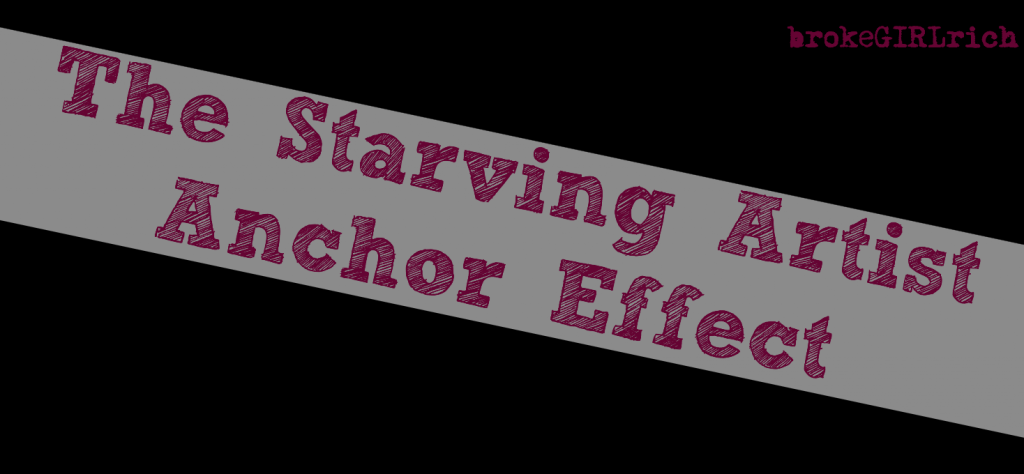
The Starving Artist Anchor Effect | brokeGIRLrich
A few weeks ago, I went on a bit of stage management specific tangent about anchoring and priming effects from reading Thinking, Fast and Slow by Daniel Kahneman.
I’m still thinking about this subject, but today I want to reflect a little on how, as performing arts workers, we get anchored in the starving artist mentality.
Just to review, anchoring is when an individual relies too heavily on an initial piece of information when making future judgements.
I think for many of us, the idea that artists starve and that the act of creating should be satisfying enough without much monetary compensation is really drilled into us early. I imagine it wasn’t just me whose parents flipped the heck out when I told them I was switching my major to theater.
We’re also conditioned to think we’re lucky just to be doing this, so should we really push that luck by expecting something ridiculous like… living wages?
All of this anchors us in a world of low financial expectations.
I mean, Mark and Roger didn’t actually freeze to death in that crazy flophouse they were living in.
Though in La Boheme, Mimi sure did die of tuberculosis.
 Over and over again, we see poverty and death romanticized for artists. It just seems normal. It’s a bit of what you expect taking this path. Suffering is part of it all. We have to pay dues. We have to struggle to make good art.
Over and over again, we see poverty and death romanticized for artists. It just seems normal. It’s a bit of what you expect taking this path. Suffering is part of it all. We have to pay dues. We have to struggle to make good art.
OMG.
WHY?
Do you know who benefits from us internalizing this myth? Anchoring ourselves in it?
Producers, ya’ll. The people who have to pay us.
We’re so convinced we’re lucky to get anything, we don’t fight for more. It seems greedy. But we’re generally being given so little, if we don’t ask for more, we don’t even hit things like minimum wage.
How many times have to divided the number of hours you actually worked into the stipend amount you were paid and a little piece of your soul died?
I’m not immune from this either. I have done it too. I’ve definitely worked a good number of gigs over the years that were wildly underpaid. Especially as a stage manager when I add in the work I do before and after rehearsals actually start, those hourly wage equivalents from a stipend plummet real quick.
And I’m not hating on 100% of producers. There are good ones out there. A few years ago, I was negotiating my contract for a show and the producer got me to name the minimum amount I would agree to take and offered me more than $1,000 a week over that. Which was actually a very fair wage for what we were doing.
On another show, I had a salary number in my head and when that job offer came through at $18,000 higher than that, I did not bother negotiating further. It was also a very fair amount for the job and in the long run I learned I was the lowest paid manager at that level.
So what both these jobs taught me is that my expectations are really very low and probably kind of wrong – especially on circus jobs where I’ve crossed into being a pretty highly skilled stage manager.
Which all goes back to anchoring.
 A few years ago now, I wrote a post asking freelancers if they have a hard minimum and stated that mine was a $100/day. That post was sparked by a conversation with some of my coworkers at the time who felt I was aiming really high.
A few years ago now, I wrote a post asking freelancers if they have a hard minimum and stated that mine was a $100/day. That post was sparked by a conversation with some of my coworkers at the time who felt I was aiming really high.
In an 8 hours day, that’s $12.50 an hour. And really how often is it an 8 hour day – on that particular job, definitely not most days.
Another weird thing about this anchoring effect is that I’ve never really adjusted it – even though I was asking for an “astronomical” $100 a day a few years ago, that’s still my go to anchor number. Even though I often work at higher than that most of the time now. I’m still anchored in this considerably low number for someone with 17 years of experience and pretty much good recommendations from everywhere I’ve worked.
For all ya’ll who have been reading for years, you are aware that while I don’t advocate working for free (unless you are legit volunteering), I do advocate occasionally working for less than your hard minimum when the opportunity is valuable enough – and it can be valuable enough for a number of reasons.
I’ve worked for less when:
- I wanted to try a new type of stage management
- I wanted to work with a particular director
- I was offered the opportunity to travel somewhere I already wanted to go
- I was recovering from personal issues at home and didn’t want to do anything really stressful
- I was trying to line up work with a particular friend or co-worker
…you never need to justify your own reasons for accepting less, but you probably want to know what they are. And how long you’ll need to make that compromise for.
And if you want a long term relationship with that company and you don’t think you’ll always want to compromise, you might want to clue them in during your negotiations why you are agreeing to less so they don’t assume you will in the future.
So what does science tell us about how we can break this anchoring bias?
There are three key steps we can use to break the bias when the starving artist anchor tries to drag us down:
- Acknowledge the bias. Just be aware that it’s real and it’s probably effecting your perception.
- Delay your decision. How often in negotiations does it feel like we just have to accept there and then? Most of the time you can ask for a day to think over the terms of the agreement and that’s totally fine. You can use that time to do some extra research, reach out to people who may have worked for the company before.
- Drop your own anchor. Decide in advance what your anchor number is (and make sure it’s a fair and well-researched number so your starving artist guilt doesn’t influence it). If you know that’s a number you would be happy with, you can offer it up first and feel content if it’s met.
While I generally outright suck at negotiations (as you can see from those examples I shared above), I am good at dropping my own anchor. Even though I occasionally get testy about finding out I’m getting paid less than others doing the same or similar job, I file that info away for my next negotiation and remind myself I am getting paid the amount I wanted, assuming the company at least meets my anchor.



